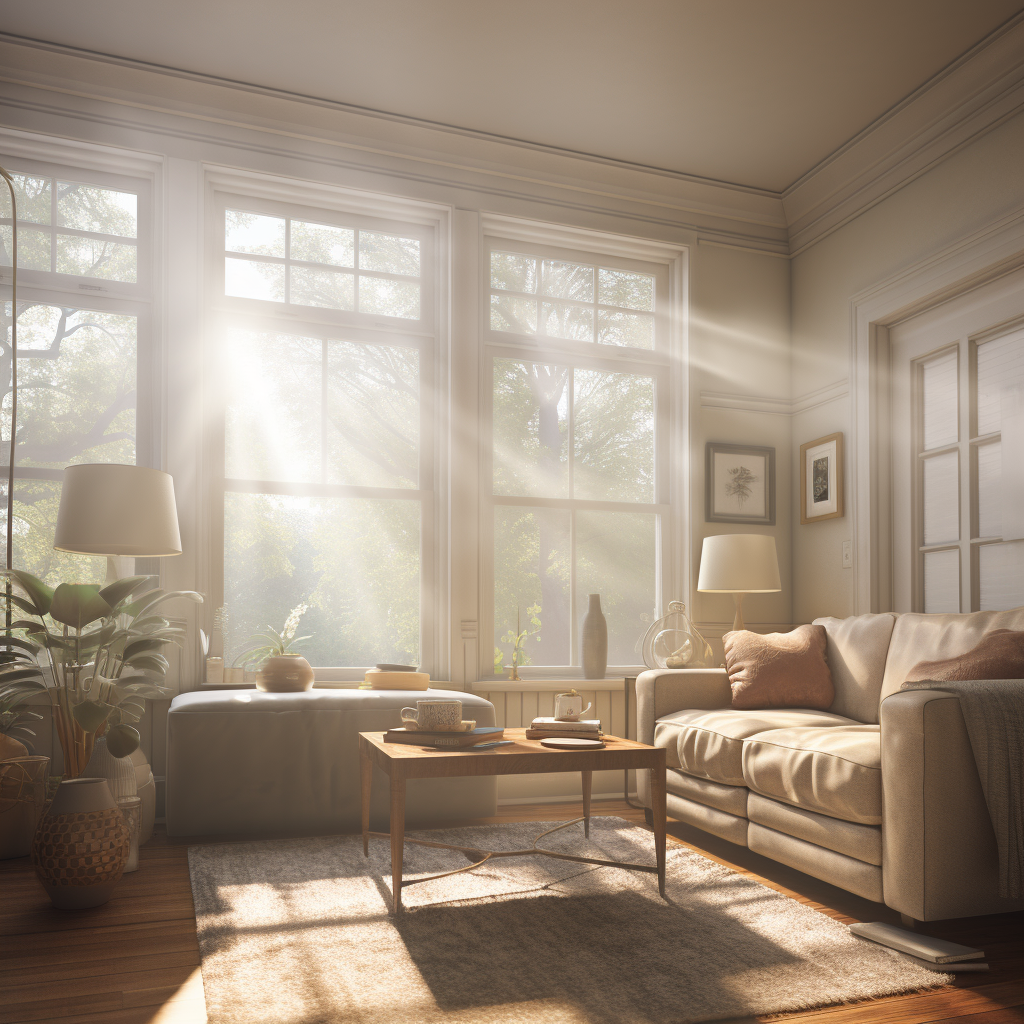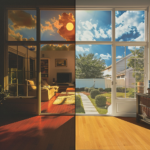
In the chilly winter months, it is imperative to consider the benefits of residential window tint. Beyond its aesthetic appeal, this transformative solution offers a myriad of advantages that extend far beyond mere looks. From enhancing energy efficiency and regulating indoor temperatures to protecting against harmful UV rays and reducing glare, residential window tint provides a comprehensive solution for homeowners seeking privacy, security, and utmost comfort. In this article, we will delve into the indispensable reasons why investing in window tint during winter is a powerful choice for those in pursuit of power and well-being.
Energy Efficiency
The implementation of residential window tint enhances energy efficiency during the winter months. By adding a layer of tint to your windows, you can enjoy a range of insulation benefits that will not only keep your home warmer but also help save on energy costs. The tint acts as a barrier, preventing heat from escaping through the windows and reducing the need for excessive heating. This leads to significant cost savings on your energy bills.
In addition to the financial benefits, residential window tint also has a positive environmental impact. By reducing the amount of energy required to heat your home, you are decreasing your carbon footprint and contributing to a greener future. This is especially important as energy consumption continues to rise globally.
The comfort and well-being of your family are greatly enhanced with residential window tint. With improved insulation, you can maintain a more consistent and comfortable indoor temperature, eliminating cold spots and drafts. This creates a cozy and inviting atmosphere throughout your home, making it a more enjoyable place to live during the winter months.
Lastly, window tinting helps extend the longevity of your windows. The tint acts as a protective shield against harmful UV rays, reducing the risk of fading and deterioration. This means that your windows will remain in excellent condition for longer, saving you money on potential repairs or replacements in the future.
Temperature Regulation
To regulate indoor temperatures effectively, residential window tint can be a valuable addition to your home during the winter months. Window tint offers several insulation benefits that help in maintaining a comfortable indoor temperature. Here are four reasons why residential window tint is crucial for temperature regulation during the colder months:
- Heat retention: Window tint helps to trap the heat inside your home by reducing heat loss through the windows. It acts as an additional layer of insulation, preventing cold air from seeping in and warm air from escaping. This allows you to maintain a consistent and comfortable temperature indoors.
- Cold weather advantages: Window tint is designed to block out the cold air and keep it from entering your home. By reducing drafts and minimizing heat transfer, it helps to create a cozy environment, even during harsh winter conditions.
- Thermal comfort: With window tint, you can enjoy improved thermal comfort by reducing temperature fluctuations near windows. It helps to create a more balanced indoor climate, eliminating hot or cold spots and ensuring a pleasant living environment throughout your home.
- Energy conservation: By reducing heat loss and minimizing the need for excessive heating, window tint contributes to energy conservation. It helps to lower your energy consumption and decrease utility bills while still keeping your home warm and comfortable.
Investing in residential window tint provides numerous benefits, including improved temperature regulation, insulation, and energy conservation. With its ability to retain heat and create a comfortable indoor climate, window tint is an essential addition to any home during the winter months.
UV Ray Protection
One major benefit of residential window tint during the winter months is its ability to provide effective UV ray protection. While many people associate UV rays with the summer months, it is important to remember that UV rays are present year-round, even during the winter. UV rays can be harmful to our skin and eyes, causing sunburn, premature aging, and an increased risk of skin cancer. By installing residential window tint, you can create a barrier that blocks up to 99% of harmful UV rays from entering your home.
Not only does window tint protect our skin and eyes, but it also helps to preserve our furniture. UV rays can cause fading and discoloration of fabrics, wood, and other materials. By reducing the amount of UV rays that enter your home, you can prolong the lifespan of your furniture and keep it looking vibrant and new.
Fade prevention is not the only benefit of residential window tint. It also plays a significant role in maintaining indoor comfort. During the winter, window tint helps to insulate your home by reducing heat loss through windows. This can help to create a more comfortable indoor environment and reduce your heating costs.
Reduced Glare
Residential window tint provides an effective solution for reducing glare during the winter months. Glare caused by sunlight reflection can be a major source of eye strain, especially when it reflects off snow or other reflective surfaces. By applying window tint, homeowners can enjoy increased visibility and reduce the discomfort caused by glare. Here are four reasons why reducing glare through window tinting is beneficial:
- Eye Strain Reduction: Glare can cause eye fatigue and discomfort, leading to headaches and reduced productivity. Window tinting reduces the amount of sunlight entering the room, minimizing eye strain and allowing for more comfortable viewing.
- Increased Visibility: By reducing glare, window tinting improves visibility by eliminating the excessive brightness that can impair vision. This is particularly important during winter when the low angle of the sun and the reflective surfaces intensify glare.
- Aesthetics: Window tinting adds a sleek and modern touch to the overall appearance of a home. It enhances the aesthetics of windows, giving them a more attractive and uniform look.
- Cost Effectiveness: Window tinting can help reduce energy costs by reducing the need for artificial lighting and minimizing heat gain during the winter months. This energy efficiency can lead to significant savings on utility bills over time.
Privacy and Security
Reduced glare is not the only benefit of residential window tinting during the winter months; it also enhances privacy and security. Window tinting provides an additional layer of protection by making it difficult for outsiders to see inside your home. This added privacy gives you peace of mind knowing that your personal space is shielded from prying eyes.
Moreover, window tinting also contributes to increased security. The tinted film acts as a deterrent to potential burglars, as it obscures the view of valuable possessions inside your home. This makes it less likely for your house to become a target for theft or break-ins.
In addition to privacy and security, residential window tinting offers other advantages as well. The tinted film reduces noise infiltration, providing a quieter and more peaceful living environment. It also helps prevent fading of furniture, carpets, and other interior décor items by blocking harmful UV rays. Furthermore, window tinting enhances the aesthetics of your home, giving it a sleek and modern look.
Conclusion
In conclusion, residential window tinting is essential during the winter months for several reasons. It significantly improves energy efficiency by reducing heat loss, regulates indoor temperatures, and provides protection against harmful UV rays. Additionally, it minimizes glare from the sun, ensuring a more comfortable living environment. Furthermore, window tinting enhances privacy and security by making it difficult for outsiders to see inside your home. Overall, investing in window tinting offers numerous benefits that greatly enhance your winter experience.






Comments are closed.